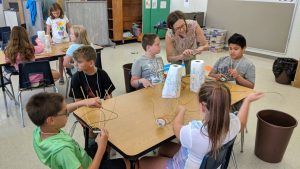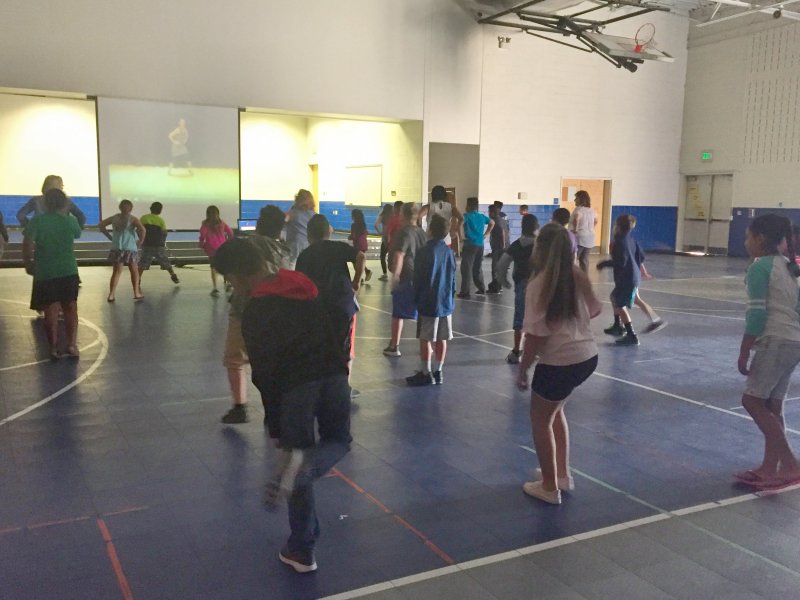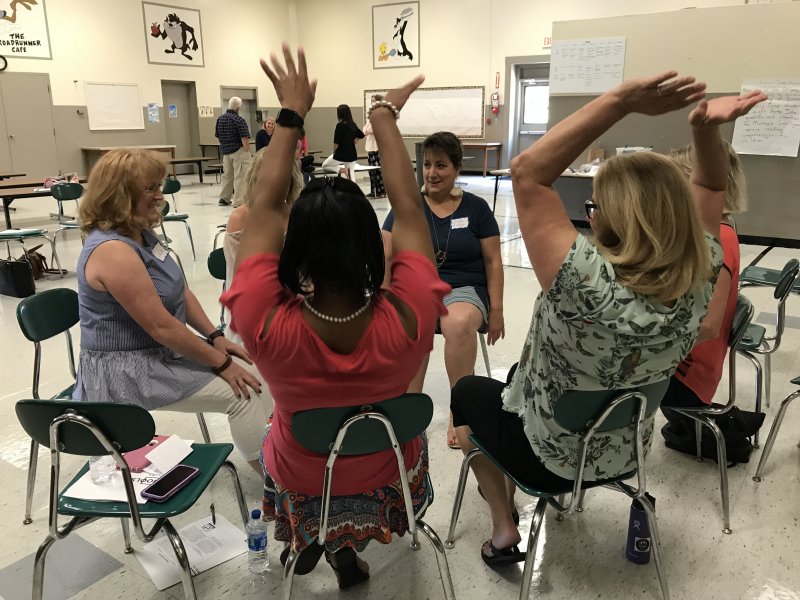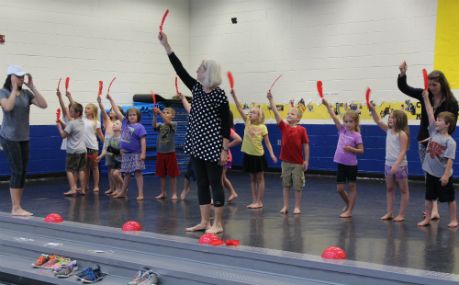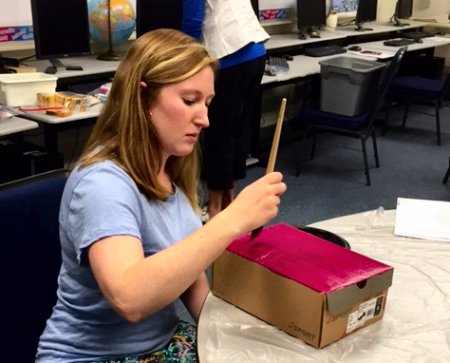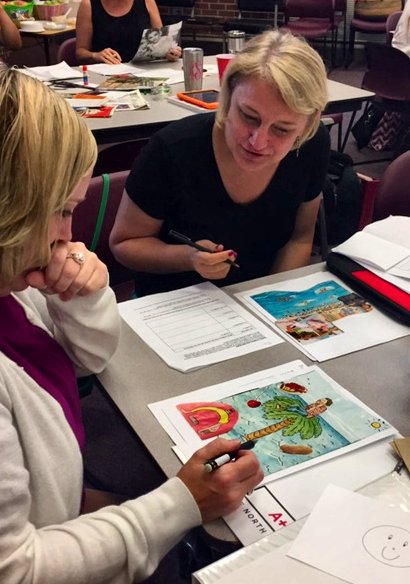Davie Students Sharpening Literacy Skills at 2019 Read to Achieve Camp
By Jeanna Baxter White
Can 16 days transform a child’s educational experience? One hundred forty-four Davie County students are finding out as they attend this summer’s Read to Achieve camp at Cornatzer Elementary School.
Read to Achieve camp is designed to help third-graders meet state requirements in reading to advance to the fourth grade. The intensive four-week camp also includes first and second graders who demonstrated the potential of reaching grade-level proficiency in reading with extra help in the summer. This year’s camp will serve 87 third-graders, 29 second-graders, and 28 first-graders.
Davie County’s camp is based on the A+Schools of North Carolina Program which combines interdisciplinary teaching and daily arts instruction to offer children multiple opportunities to develop creative, innovative ways of thinking, learning and showing what they know.
With $99,000 provided by the Mebane Foundation combined with state funds, students attending the 2019 Read to Achieve Camp will actively learn through visual arts, drama, music, and creative writing, as well as tailored instruction through Hill Center reading sessions and small group literacy circles. Each week has a different theme with most activities revolving around that topic to reinforce student understanding. Campers also learn techniques to reduce test anxiety.
This year, in addition to a traditional hands-on art class, third-graders will also benefit from a “maker space-style” STEM-based art class designed to provide hands-on learning for students and enhance their problem-solving skills. For example, during the first day of this new art class students were tasked with creating Goldilocks using various plastic pieces. Once Goldilocks was complete they created a bed from popsicle sticks and tape. The bed had to be strong enough to support Goldilocks. At the end of the assignment, they wrote out directions explaining how it was done, making it another literacy activity.
“Early introduction to STEM-focused activities and procedures can help them prepare for the rigors and expectations of a 21st-century workforce as well as prepare them for possible high school paths,” said Jeremy Brooks, camp director.
Jeremy Brooks says the students love the multiple pathways we offer them throughout the day. “The learning environment is always changing. We keep things interesting and dynamic from arrival to dismissal. All of our different activities have literacy embedded in them. Kids don’t realize that they are actually working on reading and writing because they are having too much fun! From reading scripts in “theater” class to following a set of written directions in maker-space, they are always sharpening literacy skills.”
Past results have been inspiring. During last summer’s camp, 32% of the county’s non-proficient third-graders reached the required reading achievement score to move on to fourth grade, and an additional 25 the campers passed the Read to Achieve test in the months following the camp. A remarkable 85% showed positive growth on one or more reading assessments. Furthermore, 85% of the first-graders and 80% of the 2nd-graders demonstrated significant growth over their initial scores on formative evaluations. All of the students achieved a substantial increase in confidence, engagement, and stamina in approaching new learning experiences.
The innovative nature of Davie County’s camp, as well as its high success rate, has garnered notice from the North Carolina Department of Instruction as well as school systems across the state.
Davie County was one of six districts chosen from across the state to serve as a spotlight district during the Read to Achieve Summit in Greensboro. Jennifer Lynde, DCS chief academic officer, and Christy Cornatzer, camp curriculum coordinator, had the opportunity to share about the different aspects of the camp.
“During the state’s Read to Achieve Summit, we had a wonderful opportunity to share how our district’s RTA summer camp has demonstrated significant gains in student achievement,” said Lynde. “Specifically, we were asked to focus on the hiring and retention of highly qualified reading camp teachers from year to year and practices that we’ve used during our camp that have resulted in positive outcomes. We were able to provide practical resources for other RTA summer camp leaders and share ideas about what we believe has made our camp successful.”
DCS also hosted the Piedmont-Triad Read to Achieve meeting. “The teachers from our camp were able to lead around 50 district RTA summer camp leaders and representatives from their teams through each of the components of our camp,” explained Cornatzer. “We’ve also had several districts reach out requesting our schedule and asking for suggestions of how they too can integrate the arts.”
What Does a Day at DCS Read to Achieve Camp Look Like?
The structure of the camp creates a lot of excitement. Students aren’t used to singing, dancing, and rapping during a regular school day.
The camp day begins at 8:00 a.m. with a short combined session focused on goal setting for the day. Students are divided into small groups with an average ratio of fourteen students per teacher except when students are in Hill RAP sessions at the four to one ratio. The student’s day is divided between Hill Rap sessions, writing to learn sessions, art and reading sessions, testing stamina sessions, music/theatre, and verbal expression sessions, and diagnostic reading clinic sessions. Each session lasts approximately forty-five minutes. Each day ends at 2:45 p.m
Each grade level’s lessons have a theme, and those themes are carried over to all aspects of camp. The first graders are learning about families while the second graders are studying communities. The third graders are racing across North Carolina with units about the mountains, piedmont, and coast which will give them advanced preparation for studying these topics in fourth-grade science and social studies.
Voluntary “informances” (impromptu performances that require no rehearsals) at the end of each day allow students to further build confidence as they show their best work and share with each other what they’ve learned.
At the end of the fourth week, third-grade students will be allowed to retake the RTA Reading test, which is a form of the EOG.
Innovative, Highly Effective Teachers the Key to Success
Developing highly effective students requires innovative, highly effective teachers. Jeremy Brooks says the heart of Davie’s RTA camp is its staff of passionate, dedicated educators. Each has been trained in the A+ Schools Arts Integrated Instruction program and has personally completed each and every assignment the students complete. In addition, those conducting Hill RAP sessions have previous experience teaching Hill reading methodologies. Most are RTA camp veterans who return each year because they are excited about the growth and success these students are experiencing, often for the first time.
“One of the reasons teachers like working here is because we don’t box them in. We go ahead and let them try new things, as long as they match the philosophy of the camp, which is a real selling point for teachers. Sometimes they don’t get to do that during the school year because it is so rigid with what must be taught by a given point.”
Kim Brooks, who teaches first grade at Cornatzer, feels honored to have been a part of the Read to Achieve camp since the beginning. “There are several reasons I keep coming back each summer, but the #1 reason is these kids! It is truly amazing to watch the transformation that takes place within each student in just 16 days. It’s about more than just passing a test. Our Read to Achieve camp (family) is about raising students’ self-esteem to give them the confidence they need to succeed. We are very fortunate to have the leeway to teach students by integrating the Arts into our daily instruction. This helps them to see the different ways in which they learn. Watching their energy levels change within the classroom to become active learners and leaders is a sight to behold! As an educator, it is what you wish for every student that ever enters a school building!”
Jeremy Brooks is also excited to have six new teachers as part of this year’s staff. “We have great teachers, but it’s always nice to bring in new ideas because we never want the camp to get stagnant. Although we know that we are doing good things we are always looking for ways to do things even better.”
Megan Cooper, who teaches 3rd grade at Shady Grove Elementary, chose to participate in RTA camp for the first because of her love for helping children and the desire to continue to learn and grow as an educator. “I heard such amazing reviews from teachers, parents, and students about camp. I also wanted to participate to learn from amazing veteran teachers across the county and from the A+ fellows that came in to train us. I was told it is an amazing experience and they were right! The staff here is like a family, so welcoming and fun to work with. I have learned so much from the teachers, the students, and the training we received. The camp is not like a job, it is time to help our students and have fun while doing it. I am excited to take what I have learned and implement it into my everyday classroom culture throughout the school year. Camp has been such a refreshing reminder of why I became a teacher. My biggest take away from camp is that it is important to make learning fun while helping my students.”
The Davie County educators who are teaching at this year’s Read to Achieve camp include:
- Jeremy Brooks – Camp Director (North Davie)
- Christy Cornatzer – Curriculum Coordinator (Cornatzer)
- Suzie Alonso – Hill Center (Cornatzer)
- Kerry Blackwelder – Hill Center (Cooleemee)
- Kim Brooks – Reading Coach (Cornatzer)
- Debbie Brown – 1st/2nd Teacher Assistant (Mocksville)
- Mary Lynn Bullins – Reading Coach (Cornatzer)
- Teresa Carter – Hill Center (Cooleemee)
- Amy Chappell – 3rd Grade Art (Mocksville/Cornatzer)
- Molly Connell – 2nd Grade (William R. Davie)
- Megan Cooper – Reading Coach (Shady Grove)
- Lori Culler – Reading Coach (South Davie)
- Leigh Anne Davis – Reading Coach (Pinebrook)
- Shannon Eggleston – 1st Grade (William R. Davie)
- Michael Errickson – 3rd Grade Music (Cornatzer)
- Angelina Etter – 1st Grade Hill Center (Mocksville)
- Suzie Hecht – 2nd Grade (Mocksville)
- Karen Henson – Hill Center (Mocksville)
- Jennie Kimel – 1st Grade (William R. Davie)
- Julie Marklin – 3rd Grade Art (Mocksville)
- Rachel Morse – Teacher Assistant (Cornatzer)
- Brenda Mosko – Music (South Davie/William Ellis)
- Anissa Nixon – Teacher Assistant (Mocksville)
- Erin Penley – 1st and 2nd Grade Music (Pinebrook)
- Alma Rosas – Hill Center (William R. Davie)
- Kaitlin Sizemore –Teacher Assistant (Davie High)
- Amy Spade – 2nd Grade (County)
- Susan Spear – 3rd Grade Art (Cornatzer)
- Lori Wyrick – Receptionist (Cornatzer)






